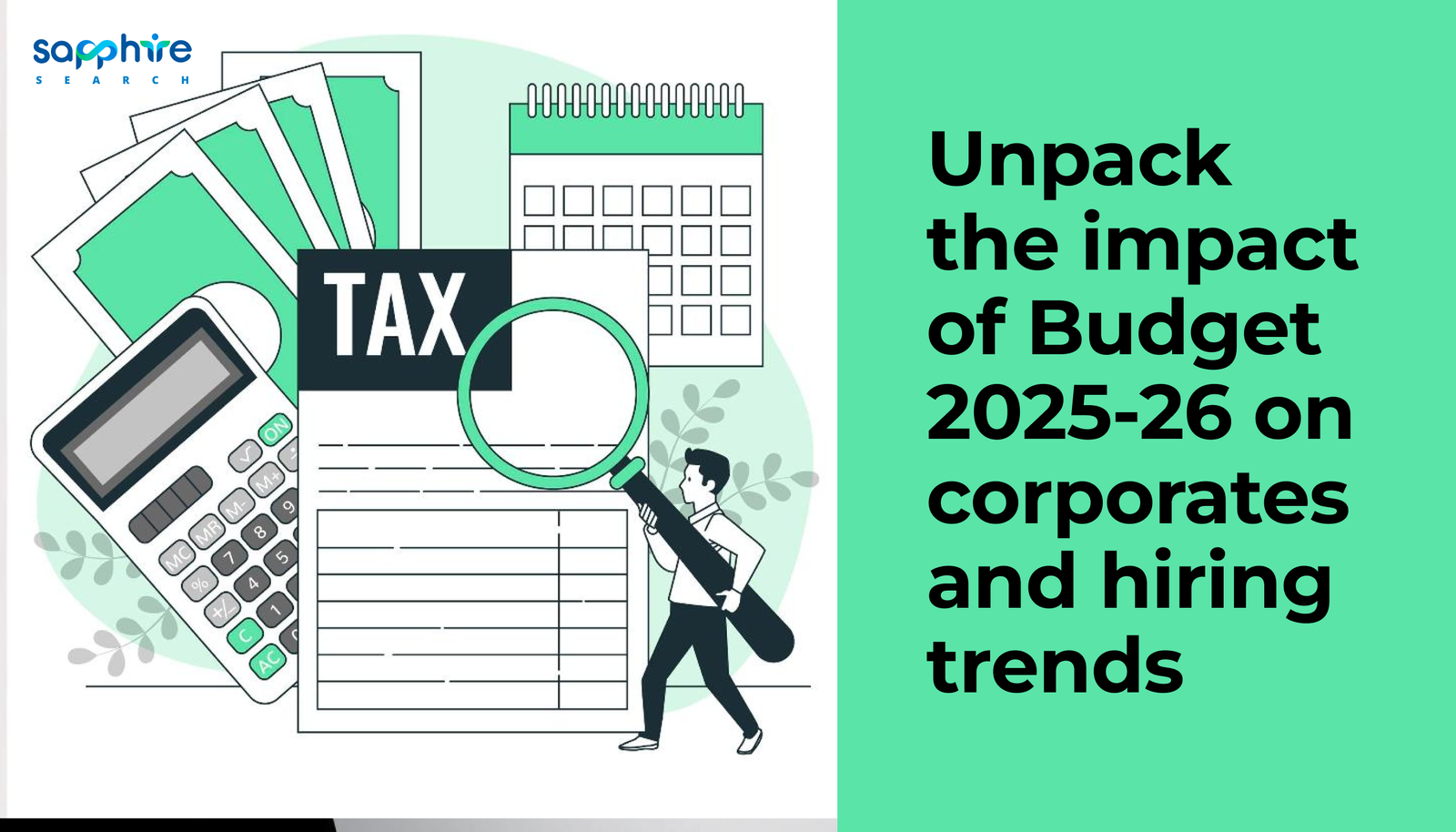The Union Budget 2025-26, presented by Finance Minister Nirmala Sitharaman, is designed to spur Budget-Driven Growth by focusing on key areas such as enhanced support for MSMEs, infrastructure development, and skill enhancement. This blog explores the potential implications of this budget on corporate strategies and hiring trends across India.
Understanding the Macroeconomic Perspective of Budget-Driven Growth
Despite a slightly lower-than-expected growth projection of 6.3 percent for 2024-25, the Indian economy remains a top performer globally. Recognizing this, the Budget 2025-26 aims to address both short-term concerns and long-term goals for "Viksit Bharat 2047".
Key Budget Highlights Fueling Budget-Driven Growth
The budget strategically balances fiscal prudence with measures promoting growth and distributive justice.
- MSME Empowerment for Budget-Driven Growth:
- The budget enhances investment and turnover limits for MSME classification, facilitating greater access to capital and technology.
- It increases the credit guarantee cover for micro and small enterprises from INR 5 crore to INR 10 crore. Startups can also access increased guarantee-backed loans.
- A new scheme will support 500,000 first-time entrepreneurs from Scheduled Castes, Scheduled Tribes, and women, providing term loans up to INR 20 million.
- Infrastructure Development for Budget-Driven Growth:
- Each infrastructure-related ministry will formulate a three-year pipeline of projects for public-private partnership.
- A second asset monetization plan will be launched for 2025-30.
- The National Geospatial Mission will be started to modernize land records and urban planning.
- Skill Enhancement for Budget-Driven Growth:
- Initiatives will focus on skilling youth for "Make for India, Make for the World" manufacturing.
- The National Manufacturing Mission will drive the ‘Make in India’ initiative, focusing on clean tech and a future-ready workforce.
Implications for Corporate Strategies in Achieving Budget-Driven Growth
- Increased Investment and Expansion:
- Enhanced support for MSMEs and startups will encourage corporate investment and expansion.
- Tax reforms aimed at boosting middle-class spending will further stimulate demand and economic growth.
- Strategic Partnerships:
- Corporates should explore partnerships with MSMEs to leverage their export capabilities and integrate them into the global value chain.
- Collaborate with the government and other stakeholders to enhance skill development initiatives and create a skilled workforce.
- Innovation and R&D:
- Focus on innovation and R&D, particularly in areas like clean tech manufacturing, to align with the budget's focus on climate-friendly development.
- Take advantage of incentives for manufacturing and ‘Make in India’ to boost production and exports.
Emerging Hiring Trends Driven by the Budget
- Increased Demand for Skilled Workforce:
- The push for manufacturing, infrastructure development, and technology will increase demand for skilled labor.
- Corporates will need to offer competitive pay and benefits to attract and retain top talent.
- Focus on MSME and Rural Sectors:
- The emphasis on MSMEs and rural development will create opportunities for job creation in these sectors.
- Companies may need to tailor their recruitment strategies to target talent in Tier-2 and Tier-3 cities.
- Digital and Technical Skills:
- The need for a workforce adept at navigating evolving compliance norms will drive demand for training in digital and technical skills.
- There will be increased hiring for roles related to AI, data analytics, and cybersecurity.
Challenges and Mitigation Strategies in Budget-Driven Growth
- Implementation of Recommendations:
- Corporates need to monitor the implementation of the 8th Pay Commission's recommendations, which could impact government finances and, consequently, the economy.
- Careful planning and financial management are essential to navigate these changes.
- Climate Adaptation Financing:
- Given the budget's limited focus on climate adaptation financing, companies should independently invest in sustainable practices.
- This will not only contribute to environmental sustainability but also enhance their brand image and attract environmentally conscious consumers.
- Integration into Global Value Chain:
- MSMEs face the challenge of becoming competitive to fit into the global value chain.
- Corporates can support MSMEs by providing access to technology, training, and market linkages.
Conclusion: Navigating Budget-Driven Growth for Long-Term Success
The Union Budget 2025-26 presents both opportunities and challenges for corporates in India. By aligning their strategies with the budget's key priorities, such as MSME empowerment, infrastructure development, and skill enhancement, companies can position themselves for Budget-Driven Growth and contribute to India's journey towards becoming a global economic powerhouse. It is crucial for corporate leaders to proactively address the talent question, invest in upskilling initiatives, and foster collaboration to ensure long-term success.

